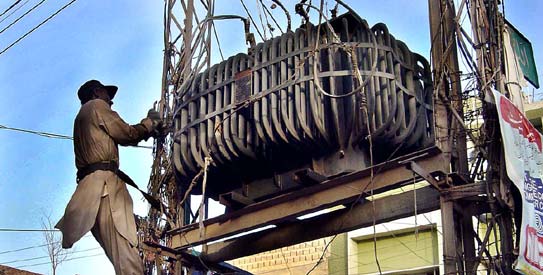
ISLAMABAD: With furnace oil stocks plummeting to a critical level, the government is finding it difficult to meet the power needs because the Pakistan State Oil is not in a position to import enough quantity of oil because of cash constraints.
A senior government official told Dawn on Monday that Wapda's furnace oil stocks have dropped to a level to meet just two days of power generation requirement that accounts for about 6-8 per cent of its mandatory reserves for a 21-day coverage.He said the government was facing problems in importing at least 750,000 tons of furnace oil necessary to meet the power generation requirement for a month. On an average, he said, the power sector required 1,000,000 tons of furnace oil a month, of which about 250,000 tons was produced locally.
“This month we do not see importing even 750,000 tons of furnace oil,” said the official, adding that the special committee on electricity loadshedding was holding regular meetings to resolve the issue of circular debt, but was still not very clear about the future course of action.
Power sector's daily requirement is about 35,000 tons, but the PSO was supplying a maximum of 22,000 tons a day because of financial constraints.
He said one thing had become clear during the committee's meetings that unless Wapda's arrears were recovered fully, it would not be possible to melt down the inter-circular debt. Wapda's total arrears against public sector consumers stood at Rs200 billion until last week and that was the real problem, the official said.
The irony of the situation is that most of the committee members were inclined to increase electricity tariff for common consumers to meet Wapda's financial problems, instead of recovering arrears from public sector consumers despite repeated decisions by the inter-provincial committees and economic coordination committee of the cabinet to disconnect electricity supply to such consumers.
The receivables of PSO against Wapda stood at Rs150 billion as of August 10, making it impossible to retire foreign letters of credit to suppliers and domestic refineries. As a result, the PSO has to pay over Rs80 billion to local refineries which had also slowed down off-take, leading to lower capacity utilisation.
In the process, refineries and marketing companies owe over Rs80 billion to oil producers led by the Oil and Gas Development Company, which is finding it hard to meet its development targets.
In addition to non-payments to the PSO, the official said Wapda's payables to gas utilities had surged to Rs100 billion.
It was, the official said, sad to note that the ministries of water and power, petroleum and finance were trying to increase gas and electricity rates to meet their cash flow requirements without realising that their tariffs were not low.
The main problems are receivables and system losses which should be addressed.












































Dear visitor, the comments section is undergoing an overhaul and will return soon.